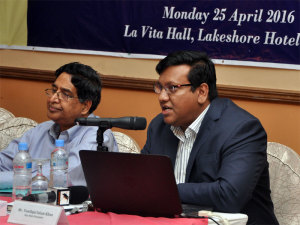Present level of budgetary allocation for education in Bangladesh is only 1.9 per cent of GDP which is one of the lowest, ranking 155 out of 161 countries. It is, therefore, high time for Bangladesh to increase budgetary allocations for education and concentrate on its proper utilisation to achieve quality outcomes. Concerted efforts towards generating resources, through raising revenue-GDP ratio, and enhancing the capacity of the local government bodies to raise revenue mobilisation are needed to help increasing budgetary allocation for quality education in the country.
These are some of the observations emerged from a CPD’s national dialogue on “Budget for Education in Bangladesh” keeping in view the upcoming national budget FY2016-17. Coinciding with the observation of Global Action Week on Education (24-30 April) 2016, the event was jointly organised with Campaign for Popular Education (CAMPE) at Lakeshore Hotel, Dhaka on Monday 25 April 2016.
The keynote presentation was made by Mr Towfiqul Islam Khan, Research Fellow, CPD based on a study titled Budget for Education in Bangladesh: An Analysis of Trends, Gaps and Priorities. His presentation highlighted the challenges in the education sector, identified priorities in the sector for adequate and proper distribution of budgetary allocation, and then put forward a set of recommendations towards ensuring quality education in Bangladesh.

Regarding the key challenges Mr Khan talked about dropout rates from schools, at both primary and secondary levels; incapacity to deliver quality education; lower teacher-student ration; obstacles to access ‘hard-to-reach’ areas and marginalised groups among others. He emphasised on making Technical and Vocational Education and Training (TVET) an integral part of the education system in Bangladesh. Mobilising necessary resources, raising allocative efficiency and ensuring efficacy of resource utilisation continue to remain as highly challenging tasks, he added.
Budgetary allocation for education should be enhanced significantly and it should be aligned with the 7FYP and sectoral education-related with the SDG 4, stressed Mr Khan. His major suggestions included improving teaching quality through the budgetary measures; funding in non-formal alternatives for out-of-school children more effectively; investing in TVET on priority basis; and providing adequate allocation for the education-related Social Safety Net Programmes (SSNPs).
Mr M A Mannan, MP, State Minister for Finance and Planning, and Dr Md Abdur Razzak, MP, as the Guests of Honour; and Dr Manzoor Ahmed, Professor Emeritus, BRAC University; Professor M M Akash, Department of Economics, Dhaka University; and Professor Shamsul Alam, Member, Planning Commission (GED) also commented on the issue as the Distinguished Discussants of the event.
Guests and speakers, in their remarks, emphasised on coordinated efforts by the government agencies for quality education. Proper utilisation of allocations by strengthening government schools, colleges and other institutions with necessary infrastructure facilities; alleviating corruption within the present structure; and more importantly, capacity development of the human resources in education sector are the major tasks to enhance the quality of education, speakers stressed.
In his introductory remarks Professor Mustafizur Rahman, Executive Director, CPD observed that allocating budget for education is the best investment for a nation. To achieve the 7FYP, he emphasised on allocative use of resources for education budget in Bangladesh.
As the Chief Guest of the event Advocate Fazle Rabbi Miah, MP, Hon’ble Deputy Speaker, Bangladesh National Parliament agreed with Mr Khan and suggested for increasing allocation in TVET. He particularly stressed on spending more in education related research and training to develop quality teachers for sustainable education.
As the Special Guest of the event Mr Nurul Islam Nahid, MP, Hon’ble Minister for Education, GoB, however, stated that the quality of education in Bangladesh has improved but there is much more to do. He agreed with the findings that proper utilisation of allocated resources will improve the present condition towards quality education.
In the concluding speech as the Chair of the session Ms Rasheda K Choudhury, Executive Director, CAMPE expressed that the government should consider the recommendations for the upcoming national budget FY2017 for further development in the education sector.
The dialogue was participated by researchers, development practitioners, education experts among others from different government and non-government organisations.


